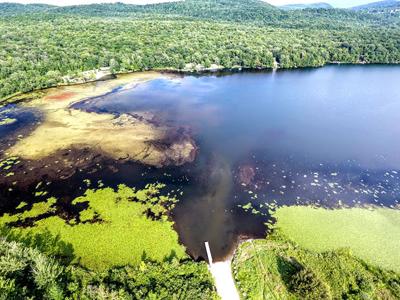Last Thursday night at Hinesburg Town Hall, every seat was taken and some folks stood in the back. Plenty of people, when signing in, checked “yes” in the column asking whether they wished to speak. The public information meeting, regarding the use of an herbicide in Lake Iroquois, drew concerns, support, and questions from an occasionally enthusiastic, occasionally apprehensive audience.
At issue is the use of the herbicide Sonar to kill Eurasian water milfoil, an invasive plant that has taken hold in much of the lake. The meeting, put on by the Department of Environmental Conservation Lakes and Ponds Management and Protection Program at the request of the Towns of Hinesburg and Williston, was an opportunity for the public to comment and ask questions. In addition to the comments collected online and by mail over the past several weeks, the audience’s input during Thursday’s meeting will play a role in the final decision to approve or deny the draft permit, submitted by the Town of Williston and currently under consideration by the DEC.
As part of a brief informational presentation at the meeting’s beginning, Lake Iroquois Association Director Jamie Carroll noted that other means of controlling milfoil had been attempted, such as the diver-assisted suction harvesting that took place last summer. Carroll said this covered only a small area and proved highly disruptive and expensive.
As DEC Program Manager Dr. Perry Thomas worked her way down the sign-in list of those wanting to speak, a panel including State Toxicologist Sarah Vose, Carroll, LIA President Pat Suozzi, DEC Environmental Analyst Misha Cetner, Marc Bellaud, President of SOLitude Lake Management, and SOLitude Lake Management Aquatic Biologist Kara Sliwaski answered questions and responded to comments.
Among commenters in support of the Sonar application were homeowners who spoke of the difficulty in enjoying activities on the lake, as well as some who spoke of fond memories at Lake Iroquois as children – memories they wanted their own children to make as well. Some noted that the science behind the application seemed sound; some applauded the LIA for their efforts in searching for a solution for the milfoil problem.
On the other hand, some homeowners with properties near Lake Iroquois and along its outlet stream and Sunset Lake, expressed concerns about the safety of their well water; one man who noted that his well is 40 feet from an outlet stream asked how he could irrigate his garden this summer given the 30-day ban on watering crops with herbicide-containing water. Some questioned the validity of studies saying that Sonar is safe for humans; others voiced concern regarding how future treatments will be funded.
Among those questioning where the money will come from was Hinesburg’s Andrea Morgante. Reached for comment after the meeting, Morgante noted, “I believe the LIA has worked very hard on this issue and appreciate their efforts but am concerned about the long term financial and organizational capacity of LIA to oversee this project.” She said, “The long-term nature of EWM [Eurasian water milfoil] control indicates that it may become an ongoing financial obligation.” Morgante later added that the application contained information about the 2017 costs, but expressed concern about how the project will be funded subsequent to that.
She also noted that Hinesburg was not involved in the permit application process, nor was Hinesburg given information on how or when comments could be submitted during the 30-day comment period. Morgante noted that the draft permit, which was submitted last November, had been mailed to the Hinesburg Town Clerk. Morgante noted that she spoke in a personal capacity, not as a member of the Hinesburg Selectboard.
Carroll noted after the meeting that the LIA expects “the funding to continue to come from a variety of sources, state grants, municipal contributions and private donations.”
Roger Donegan, who lives on the outlet stream of Lake Iroquois and worked in environmental compliance for 24 years, called the permit/application the “worst thing I’ve ever seen” at the meeting. Donegan later explained that his review of the application left him concerned about its accuracy and the thoroughness with which it had been reviewed, as well as about accountability should problems arise with the Sonar treatment.
Those present were assured that any questions not answered at the meeting will be answered soon, and the information will be made available to those concerned. At the meeting’s conclusion, small clusters formed throughout the room as neighbors lingered with DEC employees and LIA representatives, mulling over the conversation they’d shared. A final decision is forthcoming, and treatments will begin this month if the permit is approved.





















(0) comments
Welcome to the discussion.
Log In
Keep it clean. Please avoid obscene, vulgar, lewd, racist or sexual language.
PLEASE TURN OFF YOUR CAPS LOCK.
Don't threaten. Threats of harming another person will not be tolerated.
Be truthful. Don't knowingly lie about anyone or anything.
Be nice. No racism, sexism or any sort of -ism that is degrading to another person.
Be proactive. Use the "Report" link on each comment to let us know of abusive posts.
Share with us. We'd love to hear eyewitness accounts, the history behind an article.